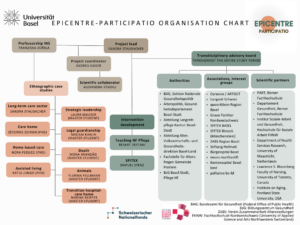Participation in Long-Term Care
An Ethnographic Study on Residential Care (EPICENTRE), Home-Based Care and Assisted Living (PARTICIPATIO) in the Cantons of Basel-Stadt and Basel-Landschaft
Funded by the Stiftung Pflegewissenschaft and the Swiss National Science Foundation.
EPICENTRE: January 1, 2024 – December 31, 2027
PARTICIPATIO: October 1, 2024 – December 31, 2027
Background
Swiss population ageing leads to a growing demand for care provision in residential and home-based long-term care (LTC) as well as in assisted living. Many older people are hesitant to use services and, in particular, to move into residential LTC (RLTC). The COVID-19 pandemic increased this hesitance as the media cemented the image of care homes as prison-like places of powerlessness. The COVID-19 pandemic was a wake-up call for research, associations, homes and non-governmental organizations, which advocate for a stronger balance of protection vs. personal freedom in care homes.
They called for a focus on older peoples’ decision-making and participation in LTC. But how and by whom are decisions regarding care home residents, older people living in assisted living or with assistance at home being made? What does participation mean to different actors of the LTC system? Where and how is participation of older people needing professional LTC practiced or missing?
Overall objectives
The objective of this project is to gain insights into decision-making processes in residential and home-based LTC and assisted living through ethnographic research. This will allow to better understand how decisions concerning the residents or patients directly are approached and taken; as to consequently understand how participation and equity of older people needing residential and home-based LTC or assisted living is understood and practiced.
Apart from older people needing residential and home-based LTC or assisted living, also their relatives as well as the LTC staff and actors from associations, cantons or municipalities are of interest to the project. The project thereby further considers the specific socio-cultural, political, legal and economic contexts of these care sectors. The knowledge gained will be used to develop ideas and approaches to promote participation and equal opportunities for people with professional LTC and to implement them sustainably with scientific support.
Specific objectives
The project has three objectives:
- To describe, how and by whom participation of older people living in residential long-term care facilities, in assisted living or at home with professional long-term care is being understood, discussed and practiced.
- To analyse potential inequalities related to the participation of older people in the long-term care sector that are unjust or unfair.
- To develop and design ideas and approaches to promote equitable participation of people living with professional LTC on several levels in the LTC sector.
Methods
Objectives 1 & 2 will follow an ethnographic approach with observation, informal conversations, semi-structured interviews and document analyses. Field research will be conducted separately in care homes, in assisted living and in home-based LTC. In care homes, research involves residents, their relatives, staff and the management. Research in assisted living includes interactions between residents, care providers and administration. In home-based LTC, research concentrates on older people living at home, their relatives and their professional care providers. Finally, research will also be conducted with cantonal and national authorities, as well as with other organizations. Throughout the project, we will hold regular meetings with a transdisciplinary advisory board to discuss findings and developments and to fulfil objective 3, which will be grounded in an implementation science approach. The advisory board consists of representatives of older people receiving LTC, their relatives, staff from the LTC sector, as well as actors from organizations, cantons and municipalities.
Expected results
This project will provide a valuable overview of decision-making processes and potentials for participation in the LTC system for all actors involved. The findings will also be discussed with the actors involved and will provide a basis for the joint development and implementation of ideas and approaches to strengthen the urgently needed participation in the LTC system.
Impact
Literature and actors in LTC management and old-age policies emphasize that the concept of participation in care homes, assisted living and in home-based care organizations is highly relevant, yet not well studied. They underline the need for scientific evidence to guide them on how to best approach the topic in both policymaking and in practice. This project will provide qualitatively well founded answers to these questions, as well as develop and implement with scientific support ideas and approaches to improve participation of people in all their diversity in residential and home-based LTC as well as in assisted living.

